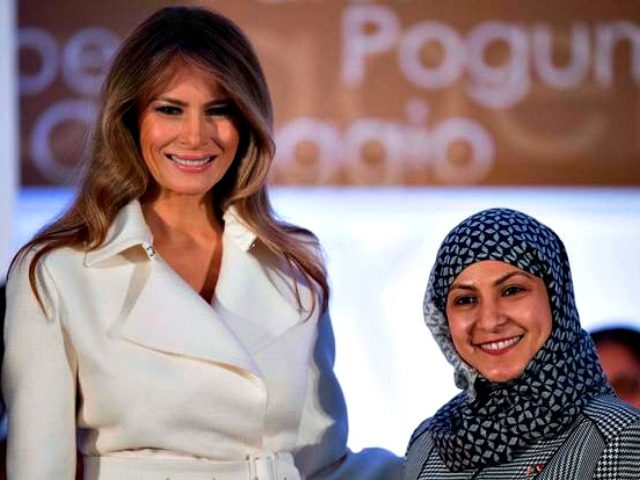First Lady Melania Trump handed out awards at the 2017 International Women of Courage awards ceremony on Wednesday at the U.S. Department of State, where she was introduced as a campaigner for the safety and security of women and girls around the world.
“The era of allowing brutality against women and children is over,” Trump said to the large crowd of guests gathered to honor 13 women who faced horrific challenges in their lives but persisted to become activists to help others facing a similar plight.
“Each one of these heroic women has an extraordinary story of courage, which should inspire each of us to achieve more than we had ever imagined possible,” Trump said before handing out statuettes and posing for pictures with each of the women.
“Their lives remind us of the boundless capacity of the human spirit when guided by moral clarity and desire to do good,” Trump said.
Watch the live speech of Melania Trump at the International Women of Courage Awards Here:
The women honored this year were:
- Sharmin Akter, a 17-year-old from Bangladesh who at 15 resisted her mother’s efforts to make her marry a much older man so she could pursue her education — setting an example for teens across South Asia who face similar pressure. Bangladesh has one of the highest rates of child marriage in the world. Sharmin is attending a girls school now and hopes to be an attorney so she campaign against child marriage.
- Malebogo Molefhe of Botswana was on the national basketball team before she was shot eight times by her boyfriend leaving her with spinal cord injuries that left her in a wheelchair. Today she works at the Ministry of Education where she helps educate children about violence. She also works with people who have been disabled because of domestic violence.
- Natalia Ponce de Leon was attacked by a stalker in 2014 who threw a liter of sulfuric acid on her face and body. After numerous surgeries Natalia said she was “reborn from the ashes” and now heads the Natalia Ponce de Leon Foundation to help acid attack victims. A law she lobbied for — and that now bears her name — that increased penalties for acid attackers was passed by the Columbian government in 2016.
- Rebecca Kabugho of the Democratic Republic of Congo was one of the youngest prisoner of conscience when she was jailed at 22 for demanding a fair election and she continues to work with the Struggle for Change movement in her homeland.
- Jannat Al Ghezi and the Organization of Women’s Freedom of Iraq take daily risks to help women in the country escape violence by offering them with shelter, training, protection and legal services. OWFI has helped more than 500 rape and domestic violence victims. Jannat understands the plight of the women she helps because she also was a victim of domestic violence.
- Major Aichatou Ousmane Issaka is deputy director of social work at the Military Hospital in Niamey, Niger. In 1996 she became the first woman in Niger to join the army. Her efforts include protecting the population from Boko Haram terrorists and working to promote the role of women in peacekeeping.
- Veronica Tamar Simogun is the director of the Family for Change Association in Papua New Guinea, which she founded to help women affected by violence. She pays for much of the work the association does with her own money and has faced death threats from perpetrators of violence.
- Arlette Contreras Bautista is a Peruvian activist, lawyer and domestic violence survivor. Her own violent relationship was captured on video and sparked nationwide outrage on the topic of domestic violence. She joined other activists to found the educational “Not One Woman Less” movement in Peru.
- Sandya Eknelygoda has been fighting for justice for families whose loved ones have disappeared, including her own husband, journalist Prageeth Eknelygoda, who went missing in 2010. She made more than 90 court appearances to try to learn her husband’s fate and has lent her voice to helping others whose loved ones have disappeared in Sri Lanka’s civil conflict.
- Sister Carolin Tahhan Fachakh, a Roman Catholic nun in Syria who regularly risks her life to help people in war-torn Damascus. She started a nursery school that has served more than 200 Muslim and Christian children. She also runs the United Nations Human Rights Council tailoring program that trains and gives financial aid to internally displaced women. Today more than 100 Muslim and Christian women participate in the program.
- Saadet Ozkan is a former primary school teacher in Turkey who uncovered child sexual abuse by the principal at the village campus where she worked. Despite pressure and a devastating car accident, Ozkan got support from the Izmir Bar Association and the Turkish Confederation of Women’s Associations to carry the case forward. She is now a consultant supporting the victims in the case.
- Fadia Najib Thabet works with non-governmental international organizations as a child protection officer tasked with helping young boys who were kidnapped or recruited by the Yemeni branch of Al Qaeda, Ansar al Sharia. She continues to work for dispossessed and displaced children through the American Refugee Committee while she attends university in the United States.
• Nguyen Ngoc Nhu Quynh could not attend the ceremony because she has been held incommunicado since Oct. 2016 when she was arrested from “conducting propaganda against the state” of Vietnam for protesting about environmental hazards in the country.

COMMENTS
Please let us know if you're having issues with commenting.